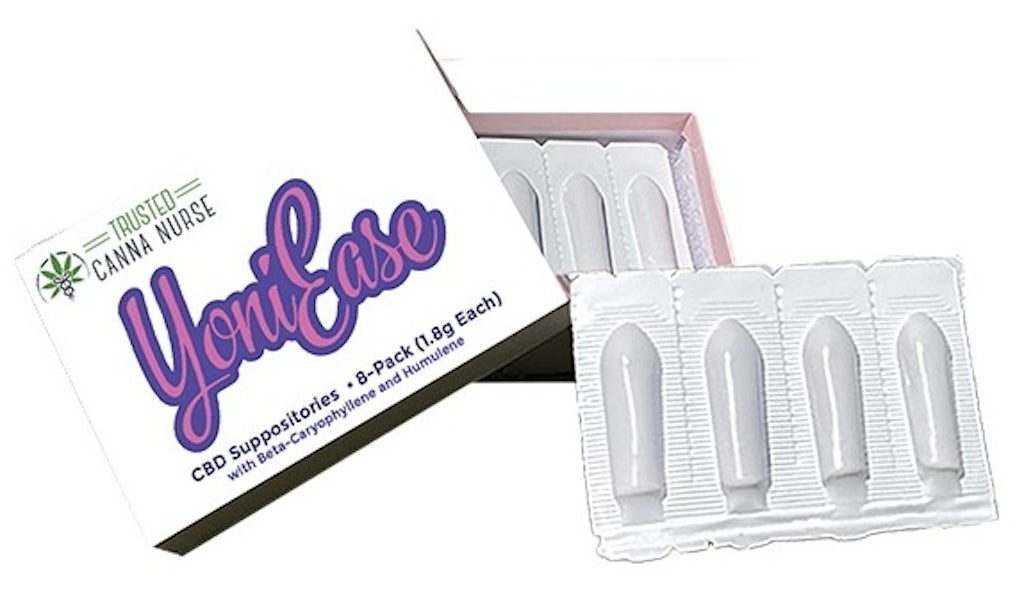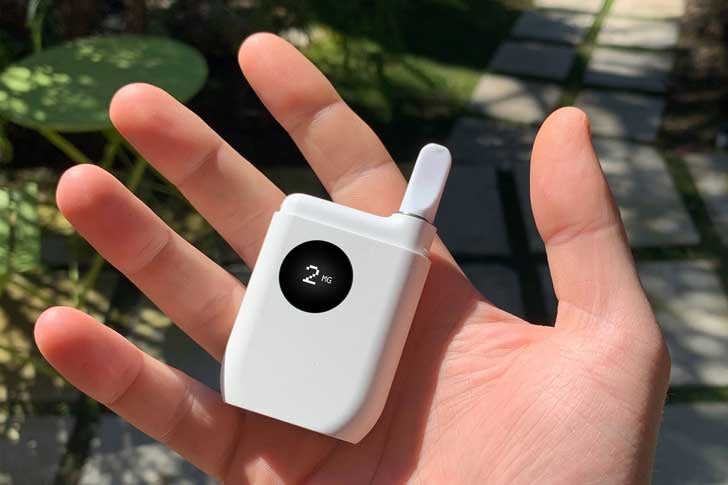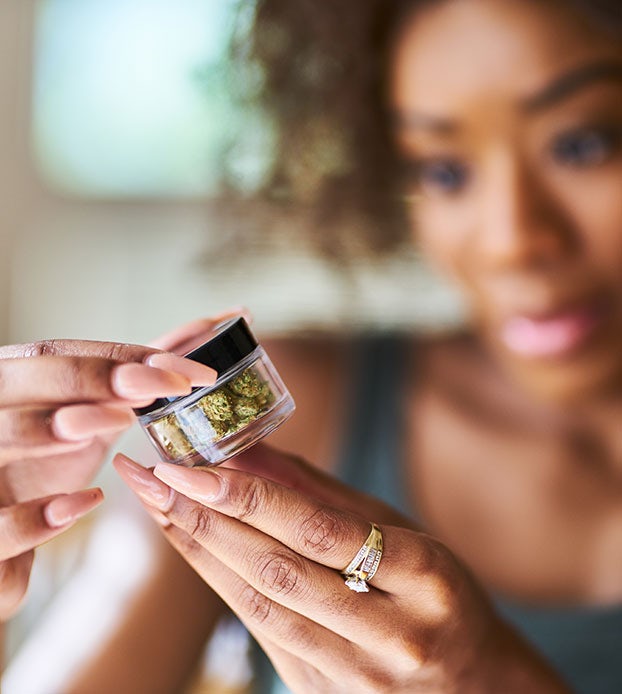The ‘clam-calming cooter shooter’ nickname for Trusted Canna Nurse’s YoniEase CBD suppositories is more than an amusing alliteration. As the brand’s founder Megan Mbengue, BSN, RN said last week, “it can be an uncomfortable topic, so there’s value in taking a playful approach.”
And indeed, suppositories are probably the least common way to deliver the benefits of cannabis – but that doesn’t mean they can’t be effective. And while socially taboo, a majority of women who deal with chronic pelvic pain are interested in trying products like these. 1
Despite the stigma, cannabis or hemp infused suppositories can be useful for people suffering from specific ailments including period pain, pelvic pain, and bladder issues. And this is far from a new concept. In fact, there is evidence of this practice in modern medicine as early as the 19th century. 2
Apart from the stigma associated with cannabis in general and suppositories specifically, access can also be an issue. Even in legal states there are only a few cannabis and CBD suppositories available in dispensaries, so it’s no surprise that there’s growing interest in homemade weed suppositories. Happily, CBD products are more widely available – so people with uteruses across the US can order the YoniEase suppository online.
How do cannabis suppositories work?
Inserted into the vagina or rectum, cannabis suppositories interact primarily with local endocannabinoid receptors found in those places. The average onset time is 15-20 minutes, and effects can last for about 6 hours. 3
It has long been established that CBD and THC both have anti-inflammatory and pain-relieving properties, making them a good fit for suppository form. These molecules also have psychoactive effects, but there’s an open question as to how much of the cannabinoids pass through the mucous membrane of the vaginal or rectum and into the bloodstream and brain. Most suppository users report little to no “high,” which suggests that delivery is mostly local. 4
Of course – dosage and individual tolerance levels are going to play a role here, and there has been very little research on the topic. We need more data – clinical and otherwise – to understand the true utility and effects of cannabis-infused suppositories.
In terms of drawbacks, it goes without saying that some people don’t love inserting medicine into their rectum or vagina – mostly due to stigma. Another consideration is that the effect is less immediate than smoking or vaping, making it more challenging than inhalables to titrate to an effective dose. Also, suppositories may not be the ideal intake method if you’re into seshing with friends or out on the town (but to each their own!).
Who can use cannabis suppositories?
Vaginal suppositories are mainly used for women-specific concerns, particularly those associated with sexual health, menstrual cycles, and menopause. Different formulations appear to be beneficial in managing various conditions such as period pain, discomfort during intercourse, vaginal dryness, and other hormone-related issues.
However, their utility extends beyond women’s health concerns to address broader issues in cases where oral or edible cannabis may not be as effective. Notably, suppositories emerge as a valuable option in medical contexts, particularly for cancer patients dealing with chemotherapy-induced nausea or vomiting and severe cases of mucositis (mouth inflammation), which can make inhaling or consuming medication challenging. 5
But they are not strictly for women. Suppositories inserted into the rectum can act locally to help combat issues related to the colon, digestive system, and overall gut health, making them an option for conditions like Irritable Bowel Syndrome (IBS), ulcerative colitis and Crohn’s disease. These conditions often wreak havoc on the lower intestines, and the localized anti-inflammatory effects of cannabis delivery directly to the site of inflammation may help alleviate symptoms.
Cannabis suppositories are usually made on a base of cocoa butter or shea butter, which are solid in the fridge or room temperature and melt and dissolve once inserted, allowing the body to access the cannabinoids from the rectum or vagina.
The YoniEase Whole Plant CBD suppository
Developed by a team of healthcare professionals with a wealth of medical cannabis experience, the YoniEase CBD suppository is a full extract cannabis oil (FECO) enriched with pain-targeted terpenes. Though men could use it as a rectal suppository, the product is ultimately targeted at women suffering from indications including endometriosis, pelvic pain, menstrual pain, bladder spasticity and even gastrointestinal issues.
The suppository is made with a cocoa butter base, infused with full spectrum cannabinoids, and enhanced the terpenes beta-caryophyllene (BCP) and humulene for an extra boost of pain relief and anti-inflammatory effects.

In a market where it’s hard to know who to trust and how to define “quality,” Trusted Canna Nurse’s suppository meets the cannabis nurse “FLOW” criteria – meaning it is flower derived, lab tested, organic, and whole plant based.
Gathering data from real cannabis consumers
With Mbengue at the helm, herself an experienced Registered Nurse, the team is passionate about providing expert consultations and craft products to medical cannabis patients. Mbengue is also months away from completing her Masters of Science in Medical Cannabis Therapeutics from Pacific College in California.
The Trusted Canna Nurse team is also all about data – which is why we’re teaming up to recruit 100 women who suffer from serious period pain to try the YoniEase suppositories. This initiative is part of our real-world data (RWD) collaboration with data and software company MoreBetter, creators of the Releaf App.
As well as gaining a data-based understanding of consumer experience with the suppository, Trusted Canna Nurse is particularly interested in confirming anecdotal reports that it provides relief from period pain without intoxication.
And by integrating input from wearable devices along with participants’ experience reports, the data set will be that much more accurate.
So how does it work?
If you’re between the ages of 18 and 45, you have a relatively regular cycle and severe pelvic pain related to your period, you’re not pregnant or breastfeeding, you’re eligible for this Pathfinder study.
- Sign up and qualify to participate
- Spend 1 minute/day answering questions on your period pain symptoms for the first menstruation cycle
- Receive a (free) supply of YoniEase CBD suppositories
- Spend 1 minute/day answering questions on your experience with the product during your next cycle
- Get insights into consumption patterns and empower the cannabis community with solid data
Sources
- Yang, E. C., Koenig, N. A., Gong, M., Brotto, L. A., Barr, A. M., Lee, T., Yong, P. J., & Geoffrion, R. (2023). Cannabis use preferences in women with myofascial pelvic pain: A cross-sectional study. European journal of obstetrics & gynecology and reproductive biology: X, 18, 100192. https://doi.org/10.1016/j.eurox.2023.100192
- Russo E. B. (2007). History of cannabis and its preparations in saga, science, and sobriquet. Chemistry & biodiversity, 4(8), 1614–1648. https://doi.org/10.1002/cbdv.200790144
- Thompson, R., DeJong, K., & Lo, J. (2019). Marijuana Use in Pregnancy: A Review. Obstetrical & gynecological survey, 74(7), 415–428. https://doi.org/10.1097/OGX.0000000000000685
- Brenneisen, R., Egli, A., Elsohly, M. A., Henn, V., & Spiess, Y. (1996). The effect of orally and rectally administered delta 9-tetrahydrocannabinol on spasticity: a pilot study with 2 patients. International journal of clinical pharmacology and therapeutics, 34(10), 446–452.
- ElSohly, M. A., Gul, W., & Walker, L. A. (2018). Pharmacokinetics and Tolerability of Δ9-THC-Hemisuccinate in a Suppository Formulation as an Alternative to Capsules for the Systemic Delivery of Δ9-THC. Medical cannabis and cannabinoids, 1(1), 44–53. https://doi.org/10.1159/000489037
Sign up for bi-weekly updates, packed full of cannabis education, recipes, and tips. Your inbox will love it.

 Shop
Shop Support
Support
















